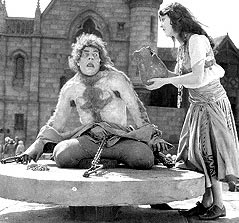Welcome to the Wakefield Doctrine (the theory of clarks, scotts and rogers)
Well…
(our only real concern is whether or the not the block-quote within a block-quote makes the text uncomfortably small for easy readin’)
Wait! There it is!
New Readers? RePrint posts are intended as much as topic jumpstarters as they are filler. The information in the RePrint is always useful, especially if’n you haven’t read all 2,939 or so posts we’ve produced.* But sometimes it helps to sneak up on the task of writing original content. Be that as it may.
We all know (or should (or will, for those here for the first(ish) time. Hey! New Reader)) that the Wakefield Doctrine is gender neutral. Matters not female or male, the principles are un-affected by gender. Culture (both local and global, i.e. human) have an effect. But the Doctrine is about the relationship between the individual and the world around them (and the people who make it up). So, sure, a scottian female might not go up to each individual in a group and push (or punch) each person on the shoulder to establish the current ranking of all. She might do something worse. (lol We will try to keep our own twisted biases and developmental embroglia out of our post-writing lol) (New Reader? Not to worry, ask one of your fellow Readers. Any of them what appear to be trying to repress laughter).
But that’s for another post.
What we were going to add was: “… gender and age neutral.”
Well, we’re out of time for this Monday. Find someone, someone that you don’t need to want to hang out with you, going into the future and say, “You know, there’s this blog where they have a personality theory that totally nails it. You should stop in some time.”
Monday -the Wakefield Doctrine- “Come on! It’s Monday, we’re counting on this Doctrine to make it less…”
January 25, 2021Welcome to the Wakefield Doctrine (the theory of clarks, scotts and rogers)
Well, lets get right to it!
‘…’
When in doubt, or the Muse has decided to sleep in*, it is never a bad thing to describe the Wakefield Doctrine. The ‘what it is’ and ‘how to use it’ kind of post. After all, we are still pursuing that, ‘now-I-can-stop-this-daily-post-thing’, the Perfect Doctrine post.
Lets see what we’ve said on the subject already.
ok, had to go back to 2013 to find one… though we suspect it was our search method, rather than that which we were looking for.
…whoa!! what the…!?!?!
Did you just get a whiff of topic?
Quick. Clear our minds.
‘My search method is at fault as opposed to the availability of what I was looking for…’
Ladies and gentlement, I believe we have a Doctrine (and General Realitivity Insight).
(Remind us to revisit this topic tomorrow. Getting late. Luckily, have the reprint still on the clipboard.)
Welcome to the Wakefield Doctrine (the theory of clarks, scotts and rogers)
It has long been my ambition to write the Perfect Wakefield Doctrine post. (One might argue about that adenoidial descriptor, it has always been my ambition, since the very first post, hell, before the very first post). In any event, I’ll give it a shot today, Monday.
The definition of perfection? A post that a total stranger, (to this blog or, for that matter, a person who has not come into contact with anyone who knows of this personalty theory), can read…once and apply it to their own life right then and there. They will look around and they will see the clarks and scotts and rogers.
As a personality theory, the Wakefield Doctrine is more the key a song is played in than it is the song. It is not a definition of a set of established behaviors, tendencies, drives and tropisms, rather it is a way of looking at (the) behaviors, tendencies, drives and tropisms that everyone you encounter today will exhibit. Including yourself. Unlike most of the personality theories that we all come into contact with, the Wakefield Doctrine is not concerned with establishing where, in a pre-established matrix of behavior, you fit best. The Wakefield Doctrine is not concerned with behavior. The Wakefield Doctrine is concerned with ‘how you relate yourself to the world around you’.
Quick set of assumptions and predicates: reality (the world around us) is, to a small, but certain extent, personal; we are, all of us, born with the capacity to experience the world around us in one of three characteristic ways: as an Outsider (clarks), as a Predator (scotts) or as a Herd Member (rogers); finally, although we all, (all of us), settle on, settle into one of the three worldviews, we never lose the capability to experience the world ‘as do the other two’.
Even though the Wakefield Doctrine is concern with relationships, it helps to have labels and definitions (provided that we do not ignore Korsybski’s famous statement, ‘the map is not the territory‘.
Hold on. Enough with the Wikipedia citations and the excessive use of semi-colons!
I think I’ll settle for a quiz that’s as close to a personality assessment as you’re going to encounter here at the Wakefield Doctrine):
- When you woke up this morning, did you feel good/scared/confident that today would be a good day in ‘the world out there’? If that sounds at all reasonable, go stand over there… no, there are others already in that section of the gym, you’ll see them when you get there.
- When you woke up this morning, did you get up? ok… amuse yourself while I deal with the last group of personality types. Sure, anywhere will be fine.
- When you woke up this morning, (well, lets rephrase that to ‘when you transitioned from quiet concern to active concern), did you feel that although you might describe yourself as confident, you will swear in a court of law that the world makes sense if you just work hard enough at understanding it. If you don’t find that description of the start of the average day totally un-reasonable, don’t go anywhere… stay here in the middle of the crowd of participants
There you have it! The three personality types of the Wakefield Doctrine!
How do you know which you are?
Up at the top of the post, I wrote ‘how you relate yourself to the world around you’. That is how you know. Even at the Doctrine, where words are viewed as either those colored semi-candy things that you sprinkle on desert or, the yellow and black Cliff Notes that serve as badges of ‘success at any cost’ in school, sometimes we mean exactly what we say. When we say, ‘how you relate yourself to the world around you’, we do not mean, ‘how you relate to the world around you’. It is about you and your relationship to the world that the Doctrine is concerned. So read some posts, read some pages that describe the characteristics of the three worldviews. The perspective ( as an Outsider or as a Predator or as a Herd Member) through which the world is least blurry, that’s your predominant worldview, your ‘personality type’.
Congratulations! You’re a clark (or) a scott (or) a roger.
Lots more to tell you* stop by anytime!
*self-grading of attempt at the perfect Post: C+ … ok a B- (seeing how you’re a clark and clarks are nothing if they’re not willing to do most things to help the other person feel better).
* There’s an ‘interesting’ idea for a story, ‘Are the dreams of a Muse painfully common and boring?’ Maybe I should write that down for the next installment in ‘the Whitechapel Interlude’
*
* ayiieee! We despair for ever developing our tertiary rogerian aspect to any kind of level as to provide us with a benefit in our efforts to reach the masses. This asteroid? Because we chose to say ‘produced’ rather than ‘wrote’. And that word choice because there is a handful, aka less than 10 posts written by a guest. Why not just use the verb write? ’cause there is a risk that someone might take exception with our statement. that’s why you know your author is a person with a clarklike predominant worldview,











